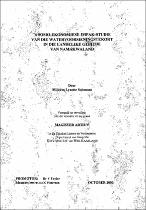'n Sosio - ekonomiese impak-studie van watervoorsienigstekort in die landelieke gebiede van Namakwaland
Abstract
Water is an indispensable source of life - it should not only be regarded as a social good, but also as a valuable economic resource. Since two thirds of South Africa are highly dependent on groundwater as a result of the lack of perennial rivers, it is essential that this resource be
conserved and protected for the future at all costs. The value of groundwater is therefore thoroughly realised in the sparsely populated and semi-arid Namaqualand. The main objective of this study was to make a survey of the availability and the quality of groundwater in the rural areas of this region, so that ultimately, a consumption strategy could be developed for the area. Since sanitation and factors associated with it cannot be separated from the water provision problems in the selected areas, it also formed part of the study. Aspects like the availability of water and sanitation facilities were scrutinised and strongly linked to social aspects around groundwater consumption and health conditions. Two small towns were used as case studies, namely Paulshoek in the Leliefontein rural area and Bulletrap in the Steinkopf area. These towns have a lack of both physical and social infrastructure, while the area as a whole is characterised by poverty. The region is inhabited by culturally homogeneous groups of people with one language and faith, who also share very similar historical backgrounds.

